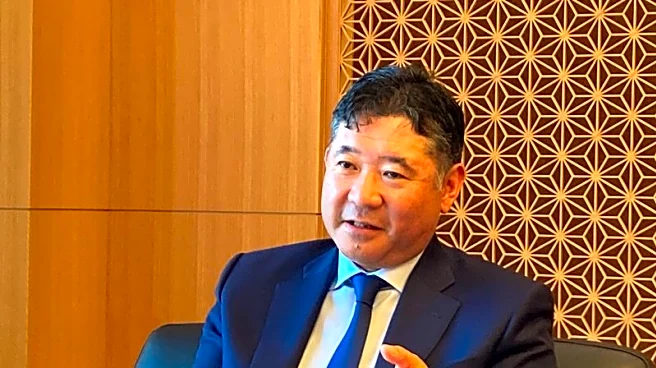What is the story about?
What's Happening?
Federal Reserve Chair Jerome Powell has indicated that the central bank is nearing the conclusion of its program to reduce the size of its bond holdings, a process known as 'quantitative tightening.' Speaking at the National Association for Business Economics' conference in Philadelphia, Powell noted that the Federal Reserve is approaching its goal of maintaining 'ample' reserves for banks, suggesting that the balance sheet runoff may end in the coming months. Despite these developments, Powell did not provide specific guidance on future interest rates. The Federal Reserve has been gradually reducing its balance sheet since mid-2022, following aggressive purchases of Treasurys and mortgage-backed securities during the COVID-19 pandemic, which had expanded the balance sheet to nearly $9 trillion.
Why It's Important?
The Federal Reserve's actions regarding its balance sheet and interest rates are closely watched by financial markets, as they have significant implications for liquidity and economic growth. The nearing end of the bond holding reduction program suggests a shift in monetary policy that could impact banks' access to liquidity and overall financial conditions. Powell's remarks also highlight ongoing concerns about the Fed's ability to pay interest on bank reserves, which has been challenged by rapid interest rate increases aimed at controlling inflation. The outcome of these policy decisions could affect economic stakeholders, including banks, investors, and policymakers, as they navigate the balance between inflation control and economic growth.
What's Next?
As the Federal Reserve approaches the end of its bond holding reduction program, financial markets and policymakers will be closely monitoring the central bank's next steps regarding interest rates and liquidity conditions. Powell's comments suggest that the Fed is cautious about further reducing reserves, which could hinder economic growth. Additionally, discussions around the Fed's ability to pay interest on reserves may continue, with potential implications for its monetary policy operations. Stakeholders, including congressional leaders and financial institutions, may react to these developments as they assess the impact on the economy and financial stability.
Beyond the Headlines
The Federal Reserve's monetary policy decisions have broader implications for the U.S. economy, including potential shifts in financial market dynamics and the balance between inflation and employment goals. The Fed's approach to managing its balance sheet and interest rates reflects ongoing challenges in navigating post-pandemic economic conditions. Ethical and legal considerations may arise from discussions about the Fed's ability to pay interest on reserves, as policymakers weigh the impact on fiscal policy and economic stability.

















